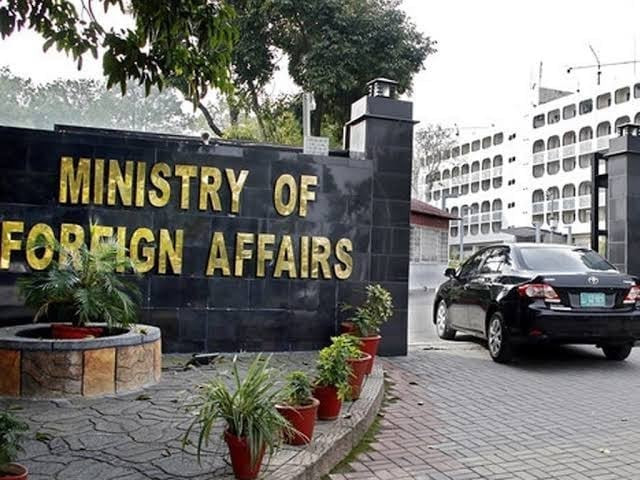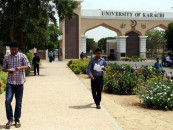Indian diplomat told to leave Pakistan within 24 hours
Indian Chargé d’Affaires was summoned to the Ministry of Foreign Affairs to communicate the decision.

Pakistan has declared a staff member of the Indian High Commission in Islamabad persona non grata for engaging in activities "inconsistent with his privileged status."
The diplomat has been given 24 hours to leave the country, according to a press release issued by the Foreign Office, it emerged on Thursday.
🔊PR NO.1️⃣4️⃣7️⃣/2️⃣0️⃣2️⃣5️⃣
— Ministry of Foreign Affairs - Pakistan (@ForeignOfficePk) May 21, 2025
A Staff Member of the Indian High Commission, Islamabad, Declared Persona Non Grata. pic.twitter.com/H6kWIlwUNY
The Indian Chargé d’Affaires was summoned to the Ministry of Foreign Affairs to communicate the decision. Pakistan reiterated that no diplomat or staff member of the Indian High Commission should misuse their privileges and status in any manner.
The development comes hours after India declared a Pakistani official posted at the Pakistan High Commission in New Delhi 'persona non grata' for similar reasons.
Read: https://tribune.com.pk/story/2547196/india-orders-another-pak-diplomat-to-leave-country
The Indian government issued a statement demanding that the Pakistani official leave within 24 hours, reinforcing its call for diplomats to refrain from activities beyond their official duties.
A demarche was also delivered to Pakistan’s Charge d’Affaires, urging him to ensure that Pakistani diplomats in India do not misuse their status.
Earlier, a suicide attack targeting a school bus in Khuzdar, Balochistan, resulted in the martyrdom of at least six individuals, including three schoolchildren.
Several others were injured when an explosive-laden vehicle rammed into the bus carrying students to the Army Public School (APS) in the Khuzdar cantonment.
The vehicle, according to the Bomb Disposal Squad, was rigged with more than 30 kilograms of explosives. The military's media wing, ISPR, blamed India and its proxies in Balochistan for orchestrating the attack.
ISPR accused India of using proxies to destabilise Pakistan, particularly in Balochistan and Khyber Pakhtunkhwa.
Read more: https://tribune.com.pk/story/2547192/suicide-bomber-targets-school-bus-in-khuzdar
Balochistan’s Chief Minister Sarfraz Bugti condemned the assault, describing it as a brutal act targeting innocent children.
He linked the attack to Indian proxies using Afghanistan as a launch pad, accusing India of supporting separatist insurgency groups in the region.
Prime Minister Shehbaz Sharif, along with military leaders, visited Quetta for an emergency briefing. The Prime Minister condemned the attack and expressed condolences to the victims' families.
He vowed to bring those responsible to justice and called for further investigation into the involvement of Indian-backed proxies in the attack.
The attack has drawn widespread international condemnation. The United States denounced the assault, with the US Embassy in Islamabad expressing "deep sorrow" and offering solidarity with the victims. "No child should ever fear going to school," US Chargé d'Affaires Natalie Baker said in a statement.
China also condemned the attack, with Ambassador Jiang Zaidong offering condolences to the victims' families and expressing strong support for Pakistan in its efforts to counter terrorism. "China opposes all forms of terrorism and will continue to firmly support Pakistan in advancing counter-terrorism operations," the Chinese ambassador stated.
Human rights groups, including the Human Rights Commission of Pakistan (HRCP), condemned the attack as a violation of international humanitarian law.
The HRCP called for the immediate identification and prosecution of those responsible and urged the Pakistani government to address the deep-rooted issues in Balochistan through lawful and peaceful means.
Pakistan-India recent conflict
The latest escalation between Pakistan and India began on April 22, when an attack in Pahalgam killed 26 people. India immediately blamed Pakistan for the incident. However, Pakistan categorically rejected the Indian blame.
In response, India undertook a series of hostile actions the next day on April 23, including suspending the 65-year-old Indus Waters Treaty (IWT), cancelling visas for Pakistani citizens, closing the Wagah-Attari border crossing, ordering the shutdown of the Pakistan High Commission in New Delhi, and reducing diplomatic staff at each other's embassies.
Tensions further escalated in the early hours of May 7, when missile strikes hit six cities in Punjab and Azad Jammu and Kashmir (AJK), destroying a mosque and killing dozens of civilians, including women, children, and the elderly.
Also Read: French intelligence official confirms downing of Rafale by Pakistan
In a swift military response, Pakistan’s armed forces shot down Indian warplanes, including three Rafale jets. The confrontation intensified again in the early hours of May 10, when India targeted several Pakistani airbases with missile strikes. In retaliation, Pakistan launched Operation Bunyanum Marsoos, damaging Indian military installations, including missile storage sites, airbases, and other strategic targets.
On May 10, US President Donald Trump announced that a ceasefire had been reached following intense diplomatic efforts overnight. Minutes later, the agreement was confirmed separately by Pakistan’s Foreign Minister Ishaq Dar and the Indian foreign secretary.




















COMMENTS
Comments are moderated and generally will be posted if they are on-topic and not abusive.
For more information, please see our Comments FAQ